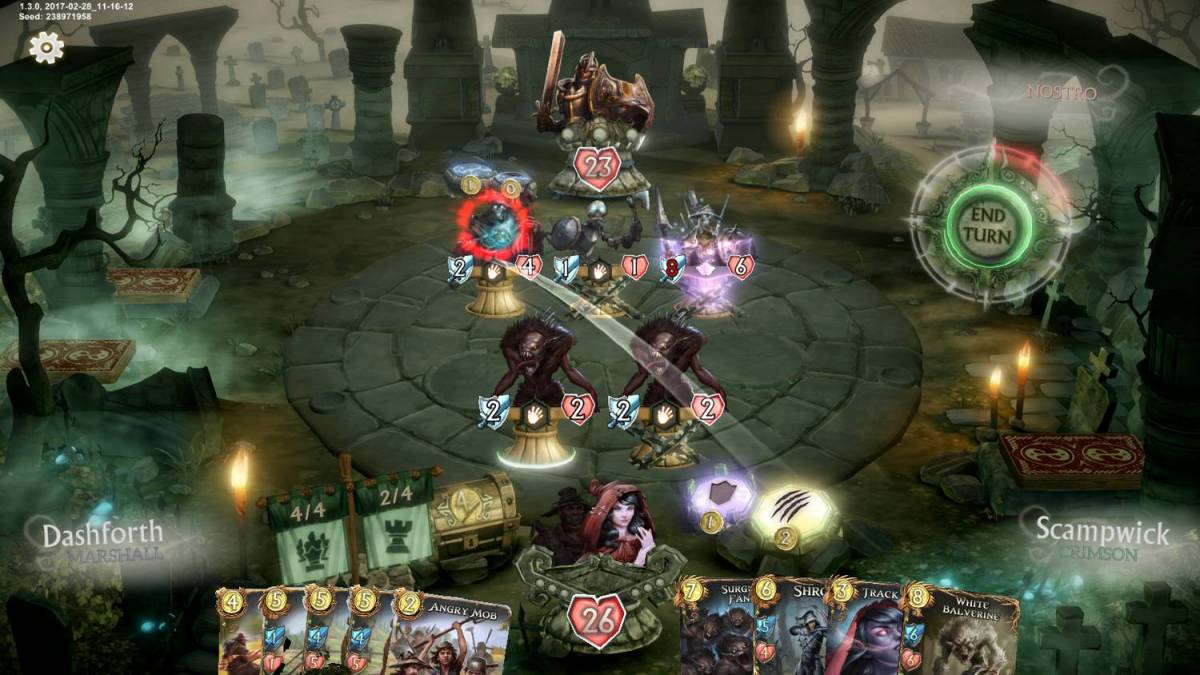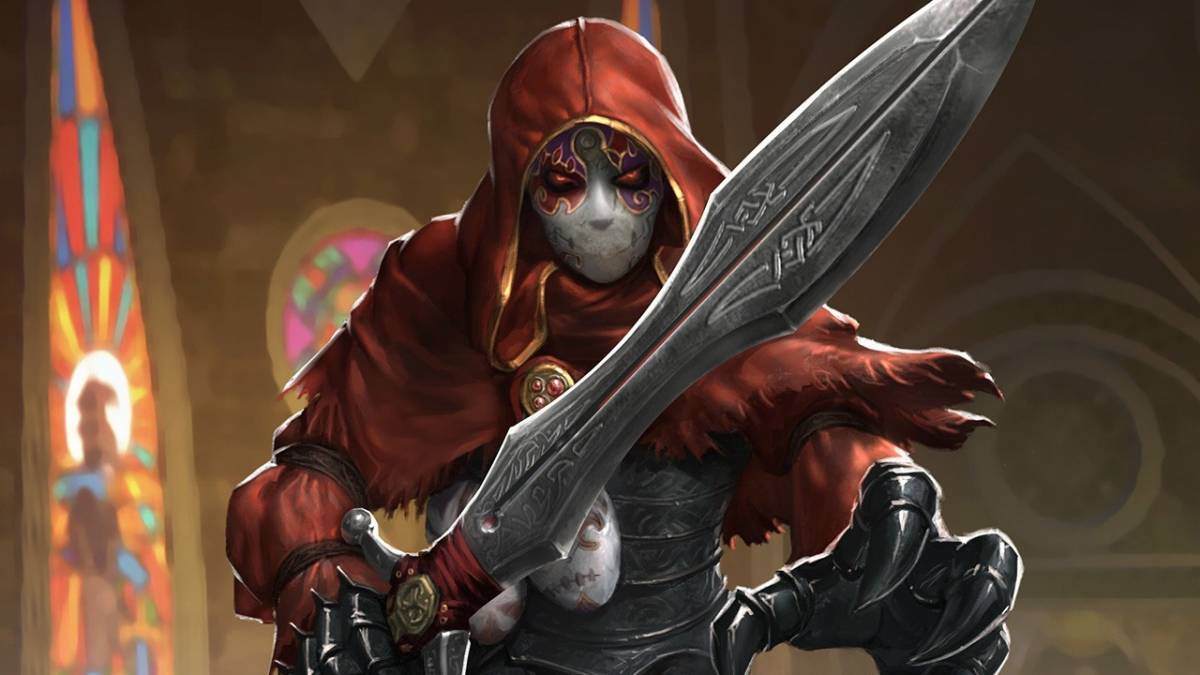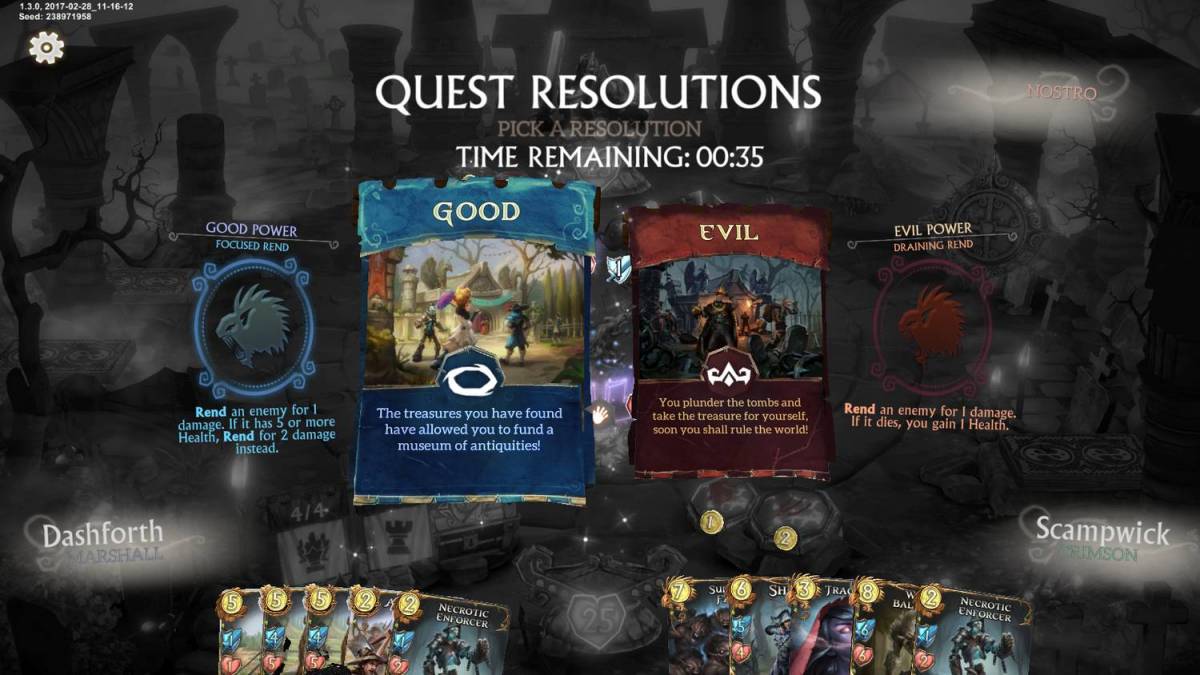Fans of the Fable series have surely heard of Fable Fortune, although others probably haven’t had their eye on that scene for a while now. It’s even a tad obscure for some card game fans. However, the latest addition to the world of digital cardboard crack has its own features to keep it in the running against other big names like Hearthstone or Magic: the Gathering. With Elder Scrolls: Legends on the march, Gwent being promoted all over the place, and Hearthstone going strong, it’s easy to ask “when is it enough?” The answer is: not yet.
There are three main types of card games in the fray as of now: those with mana available in the form of cards, those with auto-generated mana every turn, and those without mana. Fable Fortune belongs to the second category, and decides to call its mana “gold”, because we all know money makes the world go around, and if years of playing card games has taught anyone anything, it’s that even Magic costs money. Although much of the core gameplay is the same as Hearthstone (also in the second category) or Magic: The Gathering (in the first category), it has new elements that make the game unique, and spice up gameplay a bit more.

The most notable change you should prepare yourself for is the quest system. Those familiar with the Fable series know that the morality system can strongly impact your gameplay, and although it’s rather black-and-white, it’s still very interesting. The quest system manages to take this RPG morality system and stuff it into a card game. Surprisingly, it works well.
It works by letting you first choose one of three quests (that change every season) that you complete during the gameplay. Then, when you’ve completed it, you get a card, and your hero power changes. Either you choose the good side, or the evil side, but either way, your hero power changes, even getting stronger. Then you choose another quest, and it starts anew. You can complete up to 3 quests per game, and there are even cards that require you to have a certain morality level. You can also change from good to evil and back again if you wish, as the morality levels keep stacking, no matter what you choose, but all of them switch to the moral direction you chose most recently.

The quest system is not only an interesting mechanic in itself, but is also interesting because different quests require different playstyles that are technically playable with the same decks. If your opponent has picked a new quest, you should probably prepare for his tactics to change. Not only that, but the card you receive might just be exactly what you need to get your combo going, or to get your biggest unit out on the field.
Another interesting change is the “guard” mechanic, which is comparable with “Taunt” in Hearthstone. However, most units don’t come into play with guard (although there probably is one or another unit that gives a different unit guard). Instead, what you have to do is pay one gold to put your unit in guard, forcing your opponent to destroy that unit before they can attack anything else on your side of the field. Not only that, but there are also units that gain additional effects when you put them in guard, letting you activate affects for a single piece of gold every turn.

Sadly, however, Fable Fortune lacks a single-player mode, other than playing with one of the six pre-built basic class decks against the AI in either normal or hard mode, which is good for seeing what class suits you, but not much else. There is a co-op PvE mode, but those can be very annoying (like any co-op game) if you don’t have a solid partner to play with. With the whole way Fable Fortune is built, it would greatly benefit from having a single-player story mode of some kind, with specialized quests, but at the moment, there isn’t any such thing.
Although it’s not very relevant in the games themselves, each of the six classes has a backstory, a description, and a distinct personality. They’re all rather quirky, ranging from a girl with the head of her great-great-great grandfather (not on her body, on a stick), to a man who found the relics of an advanced civilisation. What is relevant, however, are the differences between the classes’ playstyles, which are influenced by their backstories (or maybe it’s the other way round? The world will never know). Each of the six has specialized cards as well as a distinct hero power which can be upgraded, catering to a certain playstyle that fits with those cards. It’s possible to play with a different style than the intended one with any class, but you won’t have all of the cards you need to build the best possible deck for that style if you don’t play that class.
All in all, Fable Fortune is a fun game to play, with games never taking very long, but still being fun, and if you find the right opponent, very interesting. However, being in its early stages, it doesn’t have too much to keep you playing unless you’re in for the long haul. However, since buying the game also gives you 20 booster packs, it’s fairly worth it, as you’ll need those cards to make anything close to a deck worth playing.
If you’re looking for a card game with a completely new concept, this won’t be your thing, but if you want something that’s a spin on the classic formula, this might just be what you’re looking for. This game definitely has potential, but they just haven’t used it yet.
Early Access preview code provided
READ MORE: Fable Fortune Tips: Quests, Heroes & Names
Some of the coverage you find on Cultured Vultures contains affiliate links, which provide us with small commissions based on purchases made from visiting our site. We cover gaming news, movie reviews, wrestling and much more.



